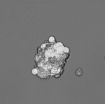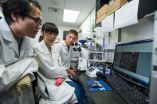(Press-News.org) Cancer stem cells are particularly difficult to eradicate and are at the heart of why it is so hard to more effectively treat cancer patients, as the post-treatment survival of cancer stem cells drives tumour recurrence, the systemic spread of cancer and, ultimately, treatment failure.
The researchers, based at the University's Institute of Cancer Sciences and the Cancer Research UK Manchester Institute - both part of the Manchester Cancer Research Centre - investigated the role of mitochondria which produce and release energy within cells. In this context, the new Manchester Centre for Cellular Metabolism (MCCM) also played a critical role in these studies.
By observing cancer stem cells in a lab setting, they discovered that mitochondria are especially important for the proliferative expansion and survival of cancer stem cells, also known as 'tumour initiating cells', which would then promote treatment resistance.
The research was carried out in breast cancer stem cells grown in a lab, but the theory was also checked against human breast cancer cells from patients. In both cases, proteins within the cells were examined. Sixty-two mitochondrial-related proteins showed significantly increased levels. In particular, fuels such as ketone and L-lactate appeared to be critical, and in the past, they have been shown to accelerate the growth of tumours.
Professor Michael P. Lisanti, Director of the Breakthrough Breast Cancer Unit, led the research. He said: "Essentially mitochondria are the "engines" of cancer stem cells and ketone and L-lactate are the high octane fuels, which promote cancer growth.
"This is one of the first times that the actions of mitochondria in cancer stem cells have been fully appreciated and the results suggest new ways in which we can drain the fuel tank - restricting cancer's ability to come back after treatment."
Trials run by Cancer Research UK are currently underway using MCT inhibitors, which also target the mitochondria in cancer cells and the researchers believe that this could, if successful, open up new avenues of treatment.
Dr Federica Sotgia, a Senior Lecturer, who also led the study, said: "Targeting the mitochondria is difficult because of potential side effects, but, if these trials prove successful, then it represents an exciting new way to treat a large number of different cancer types."
Nell Barrie, senior science information manager at Cancer Research UK, said: "Blocking cancer cells' ability to generate the energy they need to grow and divide is an exciting new avenue for future cancer treatments. This research suggests that MCT inhibitors may be particularly effective against breast cancer 'stem cells' that can resist other treatments, and could prevent the cancer from coming back - but further work is needed to find out if these drugs can help patients. Cancer Research UK is funding trials of these drugs in a range of cancer types."
Dr Matthew Lam, Senior Research Officer at Breakthrough Breast Cancer, said: "Whilst further investigation beyond the lab is needed to test the validity of these findings, this is promising work because in effect the team used one of the unique properties that cancer stem cells have against them.
"Secondary breast cancer is responsible for all deaths from the disease and we know that cancer stem cells play an important role in its development. If we are going to out-smart cancer once and for all in the future, every step taken towards finding new ways to prevent it from spreading and becoming life-threatening will be an important one."
INFORMATION:
The work presented in the paper, 'Mitochondria as new therapeutic targets for eradicating cancer stem cells: Quantitative proteomics and functional validation via
MCT1/2 inhibition' was funded by Breakthrough Breast Cancer and Cancer Research UK and was published in the journal Oncotarget.
Notes for editors
Interviews on request.
Media enquiries to:
Jamie Brown
Media Relations Officer
The University of Manchester
Tel: 0161 2758383
Mob: 07887 561318
Email: jamie.brown@manchester.ac.uk
CHICAGO (November 25, 2014) - New research shows providing detainees wash cloths treated with a skin cleanser could reduce the prevalence of Staphylococcus aureus (S. aureus) bacteria in U.S. jails. Researchers looked at the effect on transmission of S. aureus of using wash cloths treated with chlorhexidine gluconate (CHG) compared with wash cloths with only plain water in detainees at Dallas County Jail. The study was published in the December issue of Infection Control and Hospital Epidemiology, the journal of the Society for Healthcare Epidemiology of America (SHEA). ...
CHICAGO (November 25, 2014) - A new study finds a decrease in an emergent strain of methicillin-resistant S. aureus (MRSA) that is resistant to last line defense antibiotics. Researchers examined the prevalence of vancomycin-resistant Staphylococcus aureus (VRSA) infections in southeastern Michigan, where the majority of these infections have occurred in the U.S. The study is published in the December issue of Infection Control and Hospital Epidemiology, the journal of the Society for Healthcare Epidemiology of America (SHEA).
"Vancomycin is one of the few antimicrobial ...
With research and development costs for many drugs reaching well into the billions, pharmaceutical companies want more than ever to determine whether their drugs already at market have any hidden therapeutic benefits that could warrant putting additional indications on the label and increase production.
Such repurposing of drugs requires evidence of efficacy, and to find candidate drugs for randomized controlled repurposing trials, investigators can use computer simulation and scans of health care billing data, in addition to in vitro and in vivo testing.
A study led ...
Parasites use Trojan horse subterfuge to suppress the immunity of their victims when causing infection, according to a study.
The finding, which shows a new trick parasites can play, paves the way to possible treatments for infectious diseases and allergies.
Scientists have shown that parasites are able to secrete tiny sealed packages of genetic material into the cells of their victims, in order to suppress the immune response to infection.
The packages, known as vesicles, mimic those that are produced naturally in most organisms to carry out everyday functions such ...
(Boston)-- In the largest study of the genetics of memory ever undertaken, an international researcher team including scientists from Boston University School of Medicine (BUSM), have discovered two common genetic variants that are believed to be associated with memory performance. The findings, which appear in the journal Biological Psychiatry, are a significant step towards better understanding how memory loss is inherited.
Longer life spans and the increased prevalence of memory impairment and dementia world-wide underscore the critical public health importance of ...
BUFFALO, N.Y. - A new hybrid vehicle is under development.
Its performance isn't measured by the distance it travels, but rather the delivery of its cargo: vaccines that contain genetically engineered DNA to fight HIV, cancer, influenza and other maladies.
Described recently in the Proceedings of the National Academy of Sciences, the technology is a biomedical advancement that could help unleash the potential of DNA vaccines, which despite two decades of research, have yet to make a significant impact in the treatment of major illnesses.
"The technology that we're developing ...
There has been much recent debate on the benefits and risks of screening for breast cancer using BRCA1 and BRCA2 mutations in the general adult population. With an estimated 235,000 new breast cancer diagnoses each year in the U.S. and more than 40,000 deaths, it is clearly important to be able to determine which women may be genetically predisposed to breast cancer.
Glenn E. Palomaki, PhD, associate director of the Division of Medical Screening and Special Testing in the Department of Pathology and Laboratory Medicine at Women & Infants Hospital of Rhode Island has ...
This news release is available in German.
Wireless data transmission largely takes place via WLAN networks, such as WiFi. However, these networks are currently limited to high frequency ranges at 2 GHz and above and, hence, have a limited range. The authors of the study, Arnd Weber of the Institute for Technology Assessment and Systems Analysis (ITAS) of KIT and Jens Elsner, a former member of the staff of the KIT Communications Engineering Lab, propose to extend the frequencies for free communication to include lower ranges and even increased transmission power. ...
A higher surge of testosterone in competition, the so-called "winner effect," is not actually related to winning, suggests a new study of intercollegiate cross country runners.
The International Journal of Exercise Science published the research, led by David Edwards, a professor of psychology at Emory University, and his graduate student Kathleen Casto.
"Many people in the scientific literature and in popular culture link testosterone increases to winning," Casto says. "In this study, however, we found an increase in testosterone during a race regardless of the athletes' ...
Anglers across the nation wondering why luck at their favorite fishing spot seems to have dried up may have a surprising culprit: a mine miles away, even in a different state.
Scientists at Michigan State University (MSU) have taken a first broad look at the impacts of mines across the country- and found that mining can damage fish habitats miles downstream, and even in streams not directly connected to the mines.
The work is published in this week's issue of the journal Ecological Indicators.
"We've been surprised that even a single mine in headwaters might influence ...




